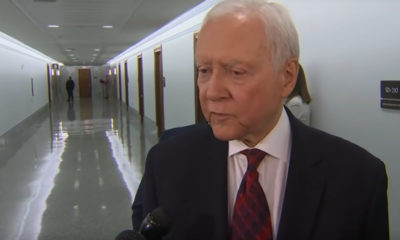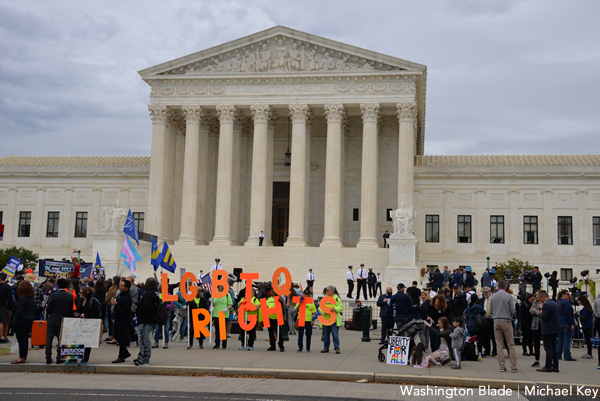National
The next champion of LGBT workplace rights?
Shiu would enforce ENDA-like executive order for federal contractors

The Obama administration official who would be responsible for enforcing a proposed federal ban on discrimination against LGBT workers by federal contractors boasts a long record of advocating for LGBT rights.
Patricia Shiu heads the Labor Department’s Office of Federal Contract Compliance Programs (OFCCP), which enforces contractual promises of equal employment opportunity for companies doing business with the federal government.
If, as advocates have been pushing him to do, President Obama issues an executive order requiring federal contractors to adopt non-discrimination policies inclusive of sexual orientation and gender identity, Shiu would be responsible for ensuring companies live up to that obligation.
Federal contractors that discriminate against LGBT employees would have to answer to Shiu — and potentially have to pay back wages and reinstate workers fired for discriminatory reasons.
Tico Almeida, president of Freedom to Work and one of the chief advocates calling for the order, called Shiu a “smart and talented attorney” and said she’s “demonstrated throughout her career a real passion and commitment to enforcing civil rights laws.”
“As the executive order has advanced through the slow bureaucratic process over the course of the last year, I have felt reassured knowing that we have strong straight allies like Director Shiu on the inside advocating for workplace fairness for LGBT Americans,” Almeida said. “She knows the legal issues backwards and forwards, in part because she has real world experience at the Employment Law Center representing LGBT Americans who have faced workplace discrimination just because of who they are or whom they love.”
Because the measure is similar in its goal to the Employment Non-Discrimination Act, the directive has sometimes been referred to as the “ENDA” executive order, although the order would be more limited in scope because it only affects federal contractors. Multiple sources have said the Labor and Justice Departments have cleared such a measure, but the White House hasn’t said whether Obama will issue the directive.
Almeida said he met with staffers from OFCCP to advocate for the executive order, and had two meetings with Shiu herself. Almeida wouldn’t comment on the substance of the meetings, and Shiu declined an interview for this article.
If Obama issues the order, Shiu would be responsible for drafting and implementing regulations, putting them through a 90-day public comment period, revising the regulations and then publishing final rules.
“That could take six, eight, 10 or even 12 months, which is why it is so critical that President Obama get the process started by signing the executive order as soon as possible,” Almeida said.
No federal law protects LGBT people from discrimination in the workplace, but observers say Shiu has distinguished herself by protecting civil rights for other groups using as tools protections already in place since she took over at OFCCP in 2009.
Executive Order 11246, signed in 1965 by President Johnson, prohibits federal contractors from discriminating on the basis of race, color, religion, sex or national origin.
Several statutes also prevent companies doing business with the federal government from discriminating against employees. Section 503 of the Rehabilitation Act of 1973 prohibits job bias based on disability and Section 4212 of the Vietnam Era Veterans’ Readjustment Assistance Act of 1974 prohibits job bias based on veteran status.
OFCCP’s work is focused on compliance evaluations of contractors who are scheduled for reviews, when compliance officers check to make sure contractors are meeting these obligations. According to the Labor Department, Shiu’s office investigated 356 complaints filed under Executive Order 11246, Section 503 of the Rehabilitation Act of 1973 and Section 4212 of the Vietnam Era Veterans’ Readjustment Assistance Act of 1974.
Under the Obama administration, OFCCP has recovered more than $30 million in financial remedies on behalf of nearly 50,000 victims of discrimination. In the past three years, the agency has evaluated more than 12,000 businesses that employ almost 5 million workers. In addition to back wages, interest and benefits, OFCCP has negotiated more than 4,800 potential job offers for workers who have been illegally subjected to discrimination.
Nancy Zirkin, executive vice president for policy at the Leadership Conference on Civil and Human Rights, had high praise for Shiu’s work in enforcing non-discrimination rules with federal contractors.
“Overall, her commitment to reinvigorate and ramp up the enforcement of the agency has been amazing, which is not surprising because she has dedicated her whole career to protecting workers and promoting diversity and enforcing the law,” Zirkin said. “In her previous role, she was always very well respected in the legal and policy advocacy community.”
Zirkin said the Employment Task Force of the Leadership Conference on Civil and Human Rights has worked with her on the National Equal Pay Enforcement Task Force, which was charged with cracking down on violations of equal pay laws affecting women.
“We think she has been throughout her career and continues to be a stellar point for the civil rights community,” Zirkin said.
If Obama were to issue the ENDA executive order, Zirkin predicted that Shiu would be an effective enforcer of that directive.
“Based on her entire life’s work, she would implement and enforce it, and as I said in the beginning, she has made a demonstrated commitment to reinvigorate and ramp up enforcement at the agency,” Zirkin said.
In June, Shiu secured one such major financial reward from a pharmaceutical giant and federal contractor as the result of allegations of gender discrimination in violation of Executive Order 11246.
AstraZeneca, among the largest pharmaceutical companies in the world, agreed to pay $250,000 to 124 women subjected to discrimination while working at the corporation’s Philadelphia Business Center in Wayne, Pa. The action resolved a lawsuit filed by the Labor Department in May 2010 alleging the company discriminated against female sales specialists by paying them salaries that were, on average, $1,700 less than their male co-workers.
OFCCP conducted a scheduled compliance review of the business center in 2002 and found AstraZeneca had violated Executive Order 11246 by failing to meet its obligations as a federal contractor to ensure employees were paid fairly. According to the Labor Department, the company holds a contract valued at more than $2 billion with the Department of Veterans Affairs to provide pharmaceutical products to hospitals and medical centers throughout the country.
Shiu is credited with being a stalwart supporter of civil rights and LGBT rights even before she came to the Labor Department. Prior to joining the Obama administration, Shiu was an attorney for 26 years at the San Francisco-based Legal Aid Society Employment Law Center and worked on employment discrimination cases, including LGBT-related cases.
Elizabeth Kristen, current director of the Employment Law Center’s Gender Equity and LGBT Rights Program, said Shiu was her mentor at the organization before she left and “an incredible champion for civil rights.”
“She is a tough litigator and she’s a passionate advocate and she’s incredibly smart and she really when she was here just went to bat for her clients,” Kristen said.
Kristen said Shiu worked on cases at the Legal Aid Society Employment Law Center affecting LGBT employees and said she “fully gets the issues and is a staunch, staunch ally to the LGBT community.” The Law Center wouldn’t reveal information about these cases, citing confidentiality agreements.
A lesbian who married her spouse in San Francisco in 2008, Kristen said Shiu in addition to her legal work was outspoken against Proposition 8, the ballot measure that ultimately eliminated marriage rights for gay couples in California.
“Many of our straight allies were working to get President Obama elected, which is great and wonderful but some of us also were fighting Prop 8 on Election Day, and Pat was also with us fighting Prop 8,” Kristen said.
Kristen added Shiu was involved in a Legal Aid Society Employment Law Center decision to gross up the pay for employees in same-sex marriages to offset the tax inequities faced by these individuals. Because of the Defense of Marriage Act, individuals in same-sex marriages have to pay a federal tax on health care benefits, unlike those in opposite-sex unions.
Should Obama issue the ENDA executive order, Kristen said Shiu “would do everything in her power to enforce it.”
“She would do everything she could to make sure that this order was fully effective because I know the rights of the LGBT community are near and dear to her heart,” Kristen said.
Federal Government
Lambda Legal praises Biden-Harris administration’s finalized Title IX regulations
New rules to take effect Aug. 1

The Biden-Harris administration’s revised Title IX policy “protects LGBTQ+ students from discrimination and other abuse,” Lambda Legal said in a statement praising the U.S. Department of Education’s issuance of the final rule on Friday.
Slated to take effect on Aug. 1, the new regulations constitute an expansion of the 1972 Title IX civil rights law, which prohibits sex-based discrimination in education programs that receive federal funding.
Pursuant to the U.S. Supreme Court’s ruling in the landmark 2020 Bostock v. Clayton County case, the department’s revised policy clarifies that discrimination on the basis of sexual orientation and gender identity constitutes sex-based discrimination as defined under the law.
“These regulations make it crystal clear that everyone can access schools that are safe, welcoming and that respect their rights,” Education Secretary Miguel Cardona said during a call with reporters on Thursday.
While the new rule does not provide guidance on whether schools must allow transgender students to play on sports teams corresponding with their gender identity to comply with Title IX, the question is addressed in a separate rule proposed by the agency in April.
The administration’s new policy also reverses some Trump-era Title IX rules governing how schools must respond to reports of sexual harassment and sexual assault, which were widely seen as imbalanced in favor of the accused.
Jennifer Klein, the director of the White House Gender Policy Council, said during Thursday’s call that the department sought to strike a balance with respect to these issues, “reaffirming our longstanding commitment to fundamental fairness.”
“We applaud the Biden administration’s action to rescind the legally unsound, cruel, and dangerous sexual harassment and assault rule of the previous administration,” Lambda Legal Nonbinary and Transgender Rights Project Director Sasha Buchert said in the group’s statement on Friday.
“Today’s rule instead appropriately underscores that Title IX’s civil rights protections clearly cover LGBTQ+ students, as well as survivors and pregnant and parenting students across race and gender identity,” she said. “Schools must be places where students can learn and thrive free of harassment, discrimination, and other abuse.”
Michigan
Mich. Democrats spar over LGBTQ-inclusive hate crimes law
Lawmakers disagree on just what kind of statute to pass

Michigan could soon become the latest state to pass an LGBTQ-inclusive hate crime law, but the state’s Democratic lawmakers disagree on just what kind of law they should pass.
Currently, Michigan’s Ethnic Intimidation Act only offers limited protections to victims of crime motivated by their “race, color, religion, gender, or national origin.” Bills proposed by Democratic lawmakers expand the list to include “actual or perceived race, color, religion, gender, sexual orientation, gender identity or expression, ethnicity, physical or mental disability, age, national origin, or association or affiliation with any such individuals.”
Democratic Gov. Gretchen Whitmer and Attorney General Dana Nessel have both advocated for a hate crime law, but house and senate Democrats have each passed different hate crimes packages, and Nessel has blasted both as being too weak.
Under the house proposal that passed last year (House Bill 4474), a first offense would be punishable with a $2,000 fine, up to two years in prison, or both. Penalties double for a second offense, and if a gun or other dangerous weapons is involved, the maximum penalty is six years in prison and a fine of $7,500.
But that proposal stalled when it reached the senate, after far-right news outlets and Fox News reported misinformation that the bill only protected LGBTQ people and would make misgendering a trans person a crime. State Rep. Noah Arbit, the bill’s sponsor, was also made the subject of a recall effort, which ultimately failed.
Arbit submitted a new version of the bill (House Bill 5288) that added sections clarifying that misgendering a person, “intentionally or unintentionally” is not a hate crime, although the latest version (House Bill 5400) of the bill omits this language.
That bill has since stalled in a house committee, in part because the Democrats lost their house majority last November, when two Democratic representatives resigned after being elected mayors. The Democrats regained their house majority last night by winning two special elections.
Meanwhile, the senate passed a different package of hate crime bills sponsored by state Sen. Sylvia Santana (Senate Bill 600) in March that includes much lighter sentences, as well as a clause ensuring that misgendering a person is not a hate crime.
Under the senate bill, if the first offense is only a threat, it would be a misdemeanor punishable by one year in prison and up to $1,000 fine. A subsequent offense or first violent hate crime, including stalking, would be a felony that attracts double the punishment.
Multiple calls and emails from the Washington Blade to both Arbit and Santana requesting comment on the bills for this story went unanswered.
The attorney general’s office sent a statement to the Blade supporting stronger hate crime legislation.
“As a career prosecutor, [Nessel] has seen firsthand how the state’s weak Ethnic Intimidation Act (not updated since the late 1980’s) does not allow for meaningful law enforcement and court intervention before threats become violent and deadly, nor does it consider significant bases for bias. It is our hope that the legislature will pass robust, much-needed updates to this statute,” the statement says.
But Nessel, who has herself been the victim of racially motivated threats, has also blasted all of the bills presented by Democrats as not going far enough.
“Two years is nothing … Why not just give them a parking ticket?” Nessel told Bridge Michigan.
Nessel blames a bizarre alliance far-right and far-left forces that have doomed tougher laws.
“You have this confluence of forces on the far right … this insistence that the First Amendment protects this language, or that the Second Amendment protects the ability to possess firearms under almost any and all circumstances,” Nessel said. “But then you also have the far left that argues basically no one should go to jail or prison for any offense ever.”
The legislature did manage to pass an “institutional desecration” law last year that penalizes hate-motivated vandalism to churches, schools, museums, and community centers, and is LGBTQ-inclusive.
According to data from the U.S. Department of Justice, reported hate crime incidents have been skyrocketing, with attacks motivated by sexual orientation surging by 70 percent from 2020 to 2022, the last year for which data is available.
Twenty-two states, D.C., Puerto Rico, and the U.S. Virgin Islands have passed LGBTQ-inclusive hate crime laws. Another 11 states have hate crime laws that include protections for “sexual orientation” but not “gender identity.”
Michigan Democrats have advanced several key LGBTQ rights priorities since they took unified control of the legislature in 2023. A long-stalled comprehensive anti-discrimination law was passed last year, as did a conversion therapy ban. Last month the legislature updated family law to make surrogacy easier for all couples, including same-sex couples.
A bill to ban the “gay panic” defense has passed the state house and was due for a Senate committee hearing on Wednesday.
Indiana
Drag queen announces run for mayor of Ind. city
Branden Blaettne seeking Fort Wayne’s top office

In a Facebook post Tuesday, a local drag personality announced he was running for the office of mayor once held by the late Fort Wayne Mayor Tom Henry, who died last month just a few months into his fifth term.
Henry was recently diagnosed with late-stage stomach cancer and experienced an emergency that landed him in hospice care. He died shortly after.
WPTA, a local television station, reported that Fort Wayne resident Branden Blaettne, whose drag name is Della Licious, confirmed he filed paperwork to be one of the candidates seeking to finish out the fifth term of the late mayor.
Blaettner, who is a community organizer, told WPTA he doesn’t want to “get Fort Wayne back on track,” but rather keep the momentum started by Henry going while giving a platform to the disenfranchised groups in the community. Blaettner said he doesn’t think his local fame as a drag queen will hold him back.
“It’s easy to have a platform when you wear platform heels,” Blaettner told WPTA. “The status quo has left a lot of people out in the cold — both figuratively and literally,” Blaettner added.

The Indiana Capital Chronicle reported that state Rep. Phil GiaQuinta, who has led the Indiana House Democratic caucus since 2018, has added his name to a growing list of Fort Wayne politicos who want to be the city’s next mayor. A caucus of precinct committee persons will choose the new mayor.
According to the Fort Wayne Journal Gazette, the deadline for residents to file candidacy was 10:30 a.m. on Wednesday. A town hall with the candidates is scheduled for 6 p.m. on Thursday at Franklin School Park. The caucus is set for 10:30 a.m. on April 20 at the Lincoln Financial Event Center at Parkview Field.
At least six candidates so far have announced they will run in the caucus. They include Branden Blaettne, GiaQuinta, City Councilwoman Michelle Chambers, City Councilwoman Sharon Tucker, former city- and county-council candidate Palermo Galindo, and 2023 Democratic primary mayoral candidate Jorge Fernandez.
-

 Africa5 days ago
Africa5 days agoCongolese lawmaker introduces anti-homosexuality bill
-

 District of Columbia1 day ago
District of Columbia1 day agoReenactment of first gay rights picket at White House draws interest of tourists
-

 World5 days ago
World5 days agoOut in the World: LGBTQ news from Europe and Asia
-

 Arizona2 days ago
Arizona2 days agoAriz. governor vetoes anti-transgender, Ten Commandments bill











